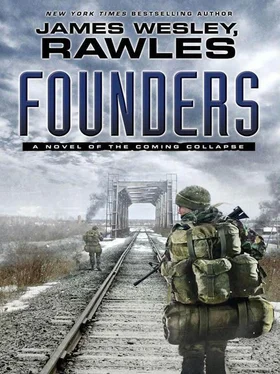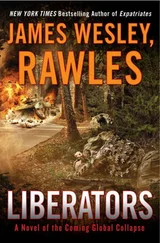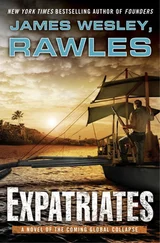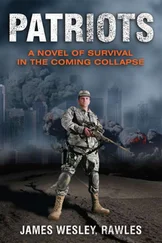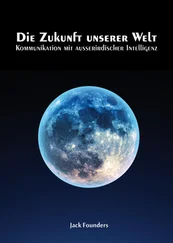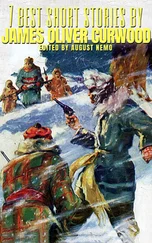James Rawles - Founders
Здесь есть возможность читать онлайн «James Rawles - Founders» весь текст электронной книги совершенно бесплатно (целиком полную версию без сокращений). В некоторых случаях можно слушать аудио, скачать через торрент в формате fb2 и присутствует краткое содержание. Город: New York, Год выпуска: 2012, ISBN: 2012, Издательство: Emily Bestler Books, Жанр: sf_postapocalyptic, на английском языке. Описание произведения, (предисловие) а так же отзывы посетителей доступны на портале библиотеки ЛибКат.
- Название:Founders
- Автор:
- Издательство:Emily Bestler Books
- Жанр:
- Год:2012
- Город:New York
- ISBN:978-1-4391-7282-7
- Рейтинг книги:5 / 5. Голосов: 1
-
Избранное:Добавить в избранное
- Отзывы:
-
Ваша оценка:
- 100
- 1
- 2
- 3
- 4
- 5
Founders: краткое содержание, описание и аннотация
Предлагаем к чтению аннотацию, описание, краткое содержание или предисловие (зависит от того, что написал сам автор книги «Founders»). Если вы не нашли необходимую информацию о книге — напишите в комментариях, мы постараемся отыскать её.
Founders — читать онлайн бесплатно полную книгу (весь текст) целиком
Ниже представлен текст книги, разбитый по страницам. Система сохранения места последней прочитанной страницы, позволяет с удобством читать онлайн бесплатно книгу «Founders», без необходимости каждый раз заново искать на чём Вы остановились. Поставьте закладку, и сможете в любой момент перейти на страницу, на которой закончили чтение.
Интервал:
Закладка:
As Pastor James swept the detector’s trapezoidal head slowly left and right, his mind soon began to wander, as it often did when detectoring. He thought about his son, Matthew, who was off training with the 3rd Liberator Brigade. The brigade was famous for freeing slaves and fighting Islamists all over the world.
James was very proud of his twenty-year-old son. Matthew had already mastered several languages, including English, Navajo, and Spanish. Now he was also learning Arabic, to ready himself for crusading. James was hoping that Matthew would return to Arizona after his militia service, but Matthew was already talking about settling in Wyoming. The lure to go there was strong. But, inevitably, like everything else, where he settled would be up to God’s plans.
James’s father, Alan Alstoba—the great-great-grandson of General Alstoba of World War III fame—was a prospector and celebrated detectorista. He had become wealthy by finding and patenting a uranium mine. But most of the old man’s cattle and fields had been passed down to his firstborn son, Jonathan. As the second-born son, James inherited only a one-tenth share of the cattle, and a few guns from the household armory. But James had become a successful detectorist in his own right, despite the fact that he devoted only two days a week to the art.
Most of the younger Alstoba’s finds on public lands over the years had been modest. But he had often found gold nuggets, iron meteorites, vehicle body panels and engine blocks, and long discarded car and truck batteries. Those had each been days to celebrate.
As always, he worked under a broad-brimmed canvas hat that had been made back east at one of the Amish communities. The hat had originally been white, but it was now badly stained by sweat and accumulated grime. As James’s wife put it, the hat had “character.” Living in Arizona, the sunshine was both a blessing and a curse. Economically, the strongest regions were the Pacific Northwest, the northern Rockies, and the Midwest. The Northwest was envied for its vast forest lands (a fantastic source of constantly renewing fuel for steam power), its wind farms, its hydroelectric dams, and its farmlands—most of which didn’t require pumped irrigation water.
The Midwest was nearly as prosperous because of its rich farmlands and its growing network of canals. But people in the arid Southwest were doomed to a lower standard of living. The Southwest’s greatest sources of wealth came from its coal mines, natural gas wells, and a few uranium mines. But without regular rains, living in the Southwest was always a struggle. At least the Mexican Border Wars were a thing of the past.
Alstoba had read that the planet was coming out of the Second Little Ice Age. For a century and a half, there had been unusually cold weather. But now some climate scientists were warning that there might finally be the long predicted global warming, as the glaciers again began to retreat. This was a great source of debate, both in scientific and political circles.
By James’s generation, there were still fifty states, but no more “capital” cities. The early twenty-first century, in addition to the First Great Die-off, was also remembered as the beginning of a monumental decentralization trend. Americans learned the hard way that large cities—especially capital cities—were targets for nukes and dirty bombs by Islamic terrorists. So the population spread out. All elections were held via the Net, and legislatures met only virtually.
Because of transportation costs, most goods were transported by ship, barge, and steam train. Steam, sail, and nuke-powered ships dominated the high seas. These days, more than half the dwindling oil production was dedicated to making lubricants rather than fuel.
By the late twenty-second century, the silver-to-gold price ratio had dropped to 5 to 1. This shift took place because silver was being used up in various industrial processes like building PV panels, and the re-cy processes couldn’t recover much of this silver. Inexorably, the price of silver rose in relation to gold.
The Islamists had made territorial gains throughout the twenty-first century, but in the twenty-second, when their oil ran out, they were forced to retreat on all fronts.
By the late 2100s there were just 50 million people living in the United States, which was deemed to be just about its long-term sustainable carrying capacity. Excess population was being shunted into the African colonies. These colonies had been developed in an attempt to repopulate the African continent, and to push out the Islamists. The Islamists had been stopped, and then pushed back, starting in Rhodbabwe, early in the twenty-second century. The rallying cry in World War IV had been “Push them back across the Zambezi.” But by Alstoba’s generation, five decades later, it was hoped that the Islamists could soon be pushed entirely off the African continent.
James heard a “whirrr!” in his headphones. Digging with his weeding probe, the target turned out to be a four-inch-long steel bolt. He put the rusty bolt in his collection bag, and resumed scanning. Two paces forward, a large hit showed up on his detector’s screen. This one turned out to be a four-foot length of rusted one-inch steel pipe. This piece alone would have made his day worthwhile. Then he found an old steel T-post, also just below the surface. This got him excited, because three years earlier he had followed one hit after another on an old fence line and had recovered seventeen T-posts in just one day. That was considered a pay dirt day.
Next, James got into an odd patch of soil, roughly rectangular, where the detector indicated a high level of diffuse iron oxide. From his past experience, he knew that this meant that a vehicle had sat there rusting for many decades before it had been hauled away for re-cy, long before James was born.
He kept searching, still finding useful nuts and bolts and other bits of rusted steel. There was enough scrap here to warrant him stopping and moving his vehicle and trailer closer, to obviate making tiring trips back and forth.
He knew he’d come upon a productive patch for finding steel. He could probably dig up valuable base metals here for several days. He pulled out his tablet and triple-tapped the stylus on his currently indicated position and said, “Good patch for scrap steel.” The icon of a human ear appeared on the screen, indicating that a new voice annotation had been made to the map.
He moved his truck and trailer in close, to an adjoining patch that he had already scanned as clear. He again flipped the PV panels down. The charge controller showed the batteries were already back up to 47 percent. The skies were still sunny, so he would have enough juice to drive home within a couple of hours. This was shaping up to be a good day.
He eyed his lunch bucket on the seat but decided to go back to scanning. He didn’t want to leave a productive patch so soon. Out of habit, he reran the detector’s bitsy sequence and put his headphones back on. After finding a couple of steel shards, some nails, and a few aluminum cans, the detector went quiet. Apparently, he was leaving the scrap field. He plodded on, and his mind began to wander again. His tablet beeped and said, “200, reminder.” That was a preprogrammed reminder that he had traveled 200 meters past the last registered hit. So he stepped two paces to his right, made a 180-degree turn, and walked back toward the productive scrap patch. After walking 150 meters, he was back in the thick of it. He dug up so many nails and cans that he had to have Mickey help him shuttle the load back to the trailer. He took a long pull from his canteen, and thought again about taking a lunch break. But he decided to press on.
When he was just fifteen meters from the rectangular patch of iron oxide, his detector started to howl. The only other times it had done this was when he found something big, like an engine block. The Minelab’s display showed a strange blinking “Fe-Pt-Au-Ag???” indication. Walking over the spot from three directions showed him that the indicated spot was about a half meter wide, and one and a half meters long. James was excited, but he didn’t lose his cool. He pulled out his tablet, triple-tapped the stylus, and said, “Large, metallic target, near surface. Could be good.”
Читать дальшеИнтервал:
Закладка:
Похожие книги на «Founders»
Представляем Вашему вниманию похожие книги на «Founders» списком для выбора. Мы отобрали схожую по названию и смыслу литературу в надежде предоставить читателям больше вариантов отыскать новые, интересные, ещё непрочитанные произведения.
Обсуждение, отзывы о книге «Founders» и просто собственные мнения читателей. Оставьте ваши комментарии, напишите, что Вы думаете о произведении, его смысле или главных героях. Укажите что конкретно понравилось, а что нет, и почему Вы так считаете.
